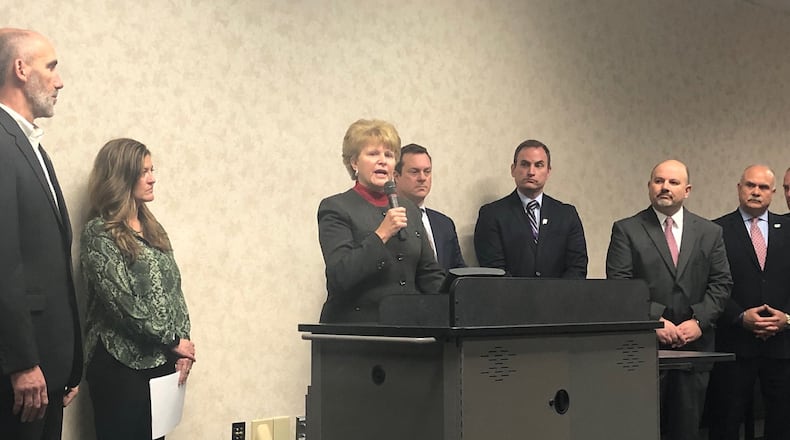JANUARY: School voucher law to change; process worries some
But after widespread push back from public schools and others, state legislators have said they intend to change some provisions of the law next week. Even Sen. Matt Huffman, a longtime advocate of the voucher system, says schools with overall A’s, B’s or C’s on the state report card should not be on the voucher eligibility list.
But now the question is, what might a hurried bill to change the law look like, and has it had enough study?
“Oftentimes legislation is created and passed that results in unintended consequences when implemented,” Vandalia-Butler superintendent Rob O’Leary said Friday. “We understand that the legislators are aware of the need for a legislative fix, and we put our faith and trust in you that you will fix this problem.”
Students qualify for vouchers primarily in two ways – either they are assigned to what the state calls an “under-performing public school” based on the state report card, or their family income is below 200% of the poverty level (below $51,500 for a family of four).
Vandalia-Butler has two of those C-graded schools on the 2020-21 voucher eligibility list (Demmitt and Morton), and O’Leary attacked the EdChoice system on multiple grounds.
DECEMBER: High-scoring public schools now subject to voucher
Academically, he asked why the state would tie voucher eligibility to a report card system that is in the process of being overhauled, amid complaints that it is flawed and inequitable. And financially, he said to take more money from “capped districts” like his that are already receiving less than the state formula says they should, is unfair.
“The state has a funding problem and cannot even follow its own funding formula,” O’Leary said. “This will jeopardize the district’s finances, stability and the quality of education for our students. This does not make sense, it’s not fair, and I can’t explain it to our community.”
Representatives of Chaminade Julienne, a Catholic high school where hundreds of students attend via EdChoice vouchers, watched Friday’s press conference. CJ officials would not answer specific questions from the Dayton Daily News, but made a statement.
“We understand the concern of our colleagues in public schools regarding the financial implications to some public school districts of this most recent expansion (of EdChoice),” CJ President Daniel Meixner said. “While we hope that all schools in the state are high-performing for the benefit of the students they serve, we know that expanded eligibility for the Ohio Educational Choice Scholarship will provide an opportunity for more families to be able to choose private education.”
Catholic schools are by far the largest recipients of voucher students locally. The Archdiocese of Cincinnati last month said vouchers give more families a chance at faith-based schooling that includes moral education, arguing that parents should be able to choose education “that matches their value system.”
2019 STORY: Private-school voucher program to double in 19-20
Dayton Public Schools Superintendent Elizabeth Lolli said private schools can pick and choose which students they educate and are not held accountable through state-issued report cards as public schools are.
“How and why is it acceptable to fund private education at the expense of the public, especially when private schools are not held accountable in the same way?” Lolli asked.
Dave Melin, regional president for PNC Bank and an advocate on many regional education efforts, also spoke at the schools’ press conference. He said Ohio needs to create greater access to high-quality learning in all settings, and he called public schools “the backbone of all communities in the Miami Valley.”
Like the public school leaders, he called for consistency in how school quality is measured.
“As business leaders, we need to make sure our schools, teachers, educators and parents have the necessary resources to ensure that all students have access to high-quality learning,” Melin said.
Voucher spending
State funding amounts to be transferred from Montgomery County school districts in 2019-20 to cover costs of students’ private school vouchers:
Dayton: $16,489,510
Huber Heights: $907,363
Kettering: $733,575
Northmont: $644,123
Jefferson Twp.: $505,657
Trotwood: $502,193
Mad River: $452,945
Centerville: $338,857
Vandalia-Butler: $337,155
Miamisburg: $336,454
West Carrollton: $324,181
Valley View: $148,100
Northridge: $107,474
Brookville: $37,025
New Lebanon: $27,000
Oakwood: $20,050
Source: Ohio Department of Education
About the Author

